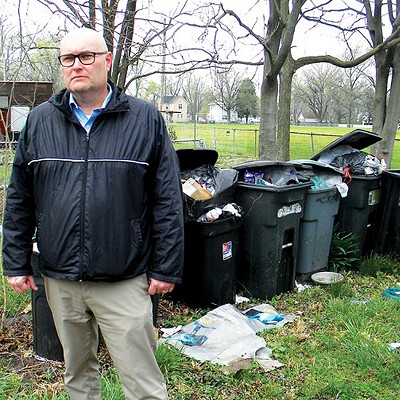Judge dismisses lawsuit over “racial profiling” traffic stop
Traffic stop tossed in state court, but federal judge upholds it
[
{
"name": "Air - MedRect Combo - Inline Content 1",
"component": "11490391",
"insertPoint": "3",
"requiredCountToDisplay": "1",
"parentWrapperClass": "fdn-ads-inline-content-block"
},{
"name": "Air - MedRect Combo - Inline Content 2",
"component": "11490392",
"insertPoint": "7",
"requiredCountToDisplay": "5",
"parentWrapperClass": "fdn-ads-inline-content-block"
},{
"name": "Air - MedRect Combo - Inline Content 3",
"component": "11490393",
"insertPoint": "12",
"requiredCountToDisplay": "9",
"parentWrapperClass": "fdn-ads-inline-content-block"
}
]
A federal judge has dismissed a lawsuit alleging police illegally stopped a Springfield resident, even though the traffic stop was thrown out of state court.
The case stemmed from a 2013 traffic stop that the lawsuit’s plaintiff claimed was racial profiling.
One evening in November 2013, Samuel Johnson of Springfield was returning home from Bloomington on Interstate 55 when a Springfield police cruiser began following him. The two officers in the cruiser pulled Johnson over on East Clear Lake Avenue for failing to properly signal a lane change.
Johnson, who is black, felt the stop was racially motivated, and when the police asked him to step out and sign his citation, he refused and was arrested. The police searched Johnson’s vehicle and found no contraband.
Sangamon County Circuit Judge Rudy Braud threw out Johnson’s ticket for failing to signal after Sangamon County prosecutors agreed that the state’s turn signal law didn’t require him to signal for 100 feet before changing lanes. The two sides agreed that the law under which Johnson was charged actually pertains to turning, not lane changes. Because the reason for the stop was deemed illegitimate, Johnson’s arrest was also quashed.
Johnson subsequently filed a lawsuit in federal court alleging that the stop violated his Fourth Amendment right against unreasonable search and seizure. While the lawsuit didn’t specifically allege racial profiling, it did note that Johnson is black and claim that each officer involved “acted willfully and wantonly, maliciously, and with a conscious disregard and deliberate indifference” to Johnson’s rights.
Although Johnson’s ticket was dismissed in Sangamon County court, that didn’t matter in federal court, where the city argued that Johnson was actually pulled over for two violations.
In the police report on the incident, the officers cite Johnson’s failure to signal for 100 feet as he moved from the right lane of Clear Lake Avenue to the left lane. However, in the federal case, the city instead emphasized that Johnson failed to signal as he moved from the interstate off-ramp to Clear Lake Avenue.
The police report makes no mention of a failure to signal at the off-ramp, although a video taken by the police cruiser’s dash cam shows no signal at the ramp. The dash cam apparently failed to record audio of the initial conversation between Johnson and Springfield police officer Jeffery Coker, but Johnson admitted during deposition that Coker informed him during the stop of his failure to signal at the off-ramp.
U.S. District Judge Colin Stirling Bruce agreed with the city and dismissed Johnson’s lawsuit on May 31.
Bruce acknowledged the differing explanations for the stop. In his 13-page opinion, he wrote that Coker had probable cause to believe that a traffic violation had occurred based on the off-ramp explanation, “even though Defendant Coker indicated a different, and legally baseless, reason for the stop in his report.”
Johnson, who later ran for mayor of Springfield because of his case, believes it was an example of a “pretextual stop,” in which police use minor traffic violations as a pretext to stop a vehicle and look for signs of illegal activity. People of color have long complained that pretextual stops are used to disproportionately target them.
Many black people feel that they are treated as dangerous criminals during routine interactions with police. Meanwhile, police say they have a difficult and dangerous job requiring split-second decisions based on limited information. The divide between those positions fills with anger and distrust, often erupting into violence.
“I could have been one of those guys,” Johnson said, referring to high-profile cases of black men killed during encounters with police earlier this month. “The citizens are not getting the justice they’re trying to get. What rights do we really have as citizens?”
Contact Patrick Yeagle at [email protected].
The case stemmed from a 2013 traffic stop that the lawsuit’s plaintiff claimed was racial profiling.
One evening in November 2013, Samuel Johnson of Springfield was returning home from Bloomington on Interstate 55 when a Springfield police cruiser began following him. The two officers in the cruiser pulled Johnson over on East Clear Lake Avenue for failing to properly signal a lane change.
Johnson, who is black, felt the stop was racially motivated, and when the police asked him to step out and sign his citation, he refused and was arrested. The police searched Johnson’s vehicle and found no contraband.
Sangamon County Circuit Judge Rudy Braud threw out Johnson’s ticket for failing to signal after Sangamon County prosecutors agreed that the state’s turn signal law didn’t require him to signal for 100 feet before changing lanes. The two sides agreed that the law under which Johnson was charged actually pertains to turning, not lane changes. Because the reason for the stop was deemed illegitimate, Johnson’s arrest was also quashed.
Johnson subsequently filed a lawsuit in federal court alleging that the stop violated his Fourth Amendment right against unreasonable search and seizure. While the lawsuit didn’t specifically allege racial profiling, it did note that Johnson is black and claim that each officer involved “acted willfully and wantonly, maliciously, and with a conscious disregard and deliberate indifference” to Johnson’s rights.
Although Johnson’s ticket was dismissed in Sangamon County court, that didn’t matter in federal court, where the city argued that Johnson was actually pulled over for two violations.
In the police report on the incident, the officers cite Johnson’s failure to signal for 100 feet as he moved from the right lane of Clear Lake Avenue to the left lane. However, in the federal case, the city instead emphasized that Johnson failed to signal as he moved from the interstate off-ramp to Clear Lake Avenue.
The police report makes no mention of a failure to signal at the off-ramp, although a video taken by the police cruiser’s dash cam shows no signal at the ramp. The dash cam apparently failed to record audio of the initial conversation between Johnson and Springfield police officer Jeffery Coker, but Johnson admitted during deposition that Coker informed him during the stop of his failure to signal at the off-ramp.
U.S. District Judge Colin Stirling Bruce agreed with the city and dismissed Johnson’s lawsuit on May 31.
Bruce acknowledged the differing explanations for the stop. In his 13-page opinion, he wrote that Coker had probable cause to believe that a traffic violation had occurred based on the off-ramp explanation, “even though Defendant Coker indicated a different, and legally baseless, reason for the stop in his report.”
Johnson, who later ran for mayor of Springfield because of his case, believes it was an example of a “pretextual stop,” in which police use minor traffic violations as a pretext to stop a vehicle and look for signs of illegal activity. People of color have long complained that pretextual stops are used to disproportionately target them.
Many black people feel that they are treated as dangerous criminals during routine interactions with police. Meanwhile, police say they have a difficult and dangerous job requiring split-second decisions based on limited information. The divide between those positions fills with anger and distrust, often erupting into violence.
“I could have been one of those guys,” Johnson said, referring to high-profile cases of black men killed during encounters with police earlier this month. “The citizens are not getting the justice they’re trying to get. What rights do we really have as citizens?”
Contact Patrick Yeagle at [email protected].
Illinois Times has provided readers with independent journalism for almost 50 years, from news and politics to arts and culture.
Your support will help cover the costs of editorial content published each week. Without local news organizations, we would be less informed about the issues that affect our community..
Got something to say?
Send a letter to the editor and we'll publish your feedback in print!
















